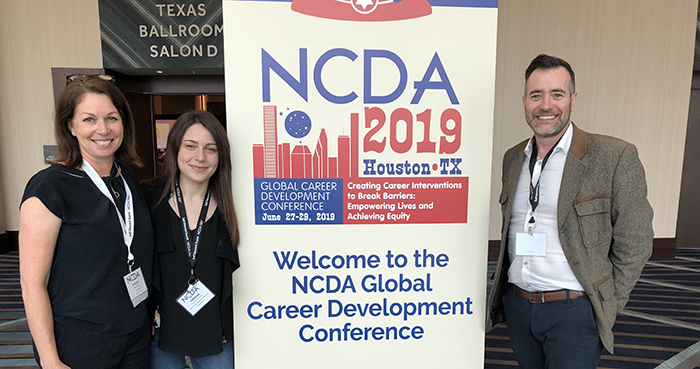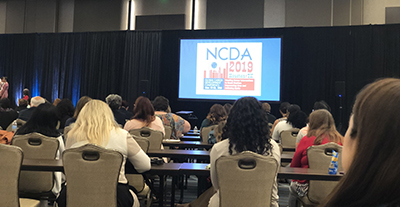Highlights of the 2019 NCDA Global Conference
09/07/19
CDAA Conference Grant recipient Amanda McCue recently attended the 2019 NCDA Global Conference in Houston, Texas. While Amanda works with clients of all backgrounds, she specialises in helping military spouses and accompanying partners, transitioning military and veterans. Amanda tells us about her experience at the conference in this post.

CDAA Conference Grant recipient Amanda McCue with other delegates
Last month, I had the privilege of attending the National Career Development Association (NCDA) Conference in Houston, Texas. This year's theme really spoke to me – Creating Career Interventions to Break Barriers: Empowering Lives and Achieving Equity. Attending an NCDA conference has been on my wish list since I joined the career development profession and this year it became possible with the assistance of a CDAA International Conference Grant. It was a conference program jam-packed with interesting sessions, so choosing which ones to go to was a significant challenge! In his opening remarks outgoing NCDA President Spencer “Skip” Niles told the audience he hoped the conference both empowered and inspired us. It certainly did both.
Some of the many highlights:
Meeting people:
You really can’t beat personal interaction! Our profession is all about people and communication so meeting many of my online connections in person and making new connections was a key highlight of this conference for me. NCDA is a wonderful community of career professionals, all of whom are so willing to share their knowledge and experience.
Presentations:

s a junior member of this profession it was an incredible experience to listen to so many leaders of career development. I was thrilled to sit in on a session by Dr Mark Savickas on career construction counselling and to listen to Dr Jane Goodman discuss transition. Her book with co-author Nancy Schlossberg on ‘Counseling Adults in Transition’ is in arms reach of my desk. It was also a privilege to listen to Mark Savickas pay tribute to the late Dr John Krumboltz, whose Happenstance Theory was an aha moment for me when I began studying career development theory.
Keynote Speakers:
I love conference keynote presentations for the inspiration they provide by introducing the audience to concepts and experiences we may not have been exposed to before and challenging us to think differently. The three keynotes at this conference didn’t disappoint. The fact that I felt strong emotions re-reading my notes speaks to the power of these presentations! Some take-home messages I gleaned from the speakers:
- From poet David Whyte –
The importance of journey/pilgrimage; the need to break promises ‘out of season’ (an old promise you made yourself can become an imprisoning force); asking for help; the “courageous step is the one you don’t want to take” and that if you are sincere about your career it should break your heart because there is no sincere path you can take in life without having your heart broken.
- From Dr Freeman Hrabowski –
“I challenge you to watch your thoughts. Your thoughts become words, your words become actions, your actions become habits, your habits become character, and your character becomes your destiny”; “never let another person define who you are”; “know your story”, “people will be inspired by stories”; the role of career development professionals as educators, leaders and ambassadors; the need to combine passion with opportunity; the challenge to write a 2-3 minute speech on why career development matters; and “NCDA you matter and you can matter more”
- From Dr Jane Goodman –
Our most important job is to inspire hope in our clients; that hope is “belief in the face of uncertainty”; how do we engender hope?; the importance of the relationship between counsellor and client; that our belief that things can happen for our clients is a necessary precondition of our work; not underestimating the importance to a person of what has happened to them - don’t disregard their pain; “when people fail we tell them to try harder. Maybe we should tell propel to try easier”; and of course her ability to sing and dance on stage.
Concurrent Sessions:
It was quite the challenge to decide on which sessions to attend out of the packed schedule. In the end I decided on the hot-off-the-press presentations by the US and Canadian teams from the International Symposium on Career Development and Public Policy (in Tromso, Norway), a thought provoking panel presentation on cultivating initiatives for equity and social justice in career services that was sponsored by the NCDA Committee on Diversity Initiatives and Cultural Inclusion, career construction practice by Mark Savickas, the Governmental Relations committee presentation, working with veterans with PTSD and a session on ethics in career practice in a culturally diverse world.
Veteran Career Development:
One of my main aims was to meet the members of the Veterans Committee in person, learn about their work and gather ideas for how we may be able to better serve the Defence community here in Australia. I attended their committee meeting on day 1 of the conference, which was a fantastic opportunity to get updates on US veteran employment data and changes to the US military transition program. I was also able to hear from two members of the NCDA Leadership Academy on their project on developing career development competencies for working with Veterans. This is a topic I am keen to explore further for its application to the Australian setting. An understanding of military culture and systems, career and transition support whilst within military, veterans’ issues etc is essential to providing quality career support to current serving and ex-ADF.
I look forward to taking the Veterans Committee’s up on their offer to remain in contact and identify areas in which we can share/collaborate. Whilst I wasn’t able to attend all veteran-related concurrent sessions, I did attend one highly relevant to my work and that was session 605 “Serviceman to Civilian: The Experiential Group Work to Prepare Veterans with PTSD for Workforce Success”. This was a great presentation, which was enhanced by the wealth of lived experience shared by the audience practitioners who were also veterans and/or military spouses.
Speaking of the Leadership Academy:
As a relatively inexperienced career development professional but one who is keen to make a contribution to the profession, I was very interested in this platform. The goal of the academy is to identify and nurture future generations of NCDA Leaders. As part of the program, participants may identify a twelve-month Leadership Action Learning Project selected from a list of Board and committee identified needs or a relevant and related career information topic.
Government Relations:
I was very fortunate to meet with Diana Bailey from the NCDA Governmental Relations Committee and attend her session. I have a keen interest in career development policy with respect to the Defence community and have met recently with two Government ministers on the topic. I enjoyed hearing about the NCDA governmental relations and legislative policies, hearing from the NCDA lobbyist and learning about what different state organisations are doing. It was wonderful to see that the NCDA Legislative Award was awarded to Senator Tim Kaine, who incidentally is an advocate for military spouse employment in the US and has introduced bills on the topic. You can read more about the NCDA committees here.
Core Values:
Throughout the conference, NCDA organisers were encouraging all members to complete the Values Survey. NCDA have identified eight core values which are: accountability, professionalism, competency, integrity, inspiration, innovation, community, diversity and inclusion. Members were asked to identify their values priorities and suggest ways in which these values can be realised in practice now and in to the future. You can read more about the values research here.
Credentialing:
Another NCDA program that had many mentions throughout the conference was the new credentialing program. NCDA offers a number of competency-based credentials/industry certifications for members to validate their qualifications and competencies. You can learn more here.
Representing CDAA:
I was very proud to share that I was attending with the support of a CDAA grant and to share some examples of the work being done in Australia. I had thought I was the only CDAA member there until the team from VTAC Careers Hub reached out via Twitter on the last day thanks to Dr Seth Hayden! I look forward to seeing them in Canberra in September for the CDAA conference.
Attending the conference was such a valuable experience – for the content of the presentations, the exposure to another country’s perspective, to learn from such a large and diverse membership base, and to be inspired and empowered to strive for continuous improvement in my own practice and in my contribution to the profession.
You can view Twitter posts on the conference using the hashtag #ncdaHouston
The next NCDA conference will be held in Minneapolis June 30-Jul 2 2020 and will explore the theme of Inspiring Innovation, Increasing Diversity, and Promoting Social Justice in Career Practice.